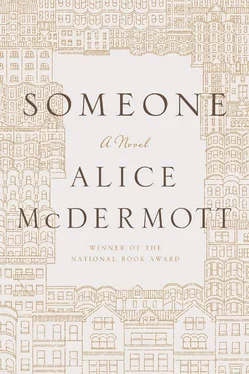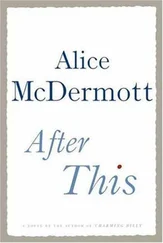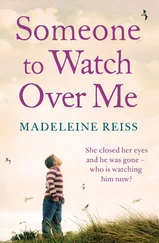We traipsed out, down the stairs, arm in arm because we were the best of best friends and there was the happiness of continuing together the sudden, elaborate affection we had showered on Mrs. Hanson. Into the cool street and around the corner, and there already the black car and the crowd of girls, some with small brothers in tow. And then, as if she had been waiting for our breathless arrival, the stirring of white in the vestibule behind the glass, the door pulled open by Dora Ryan’s stout mother in hat and gloves and a new blue suit, with a trembling orchid on her shoulder. And then Dora herself in her wedding dress and her white shoes, her old father beside her—for Dora was not a young bride, perhaps thirty or so, a third-grade teacher at a distant public school, square shouldered and broad-faced, but lovely anyway, today, in her wedding dress, satin and lace and white stockings and white shoes, with only a small veil to catch what breeze there was. Her brother followed and a sister in a pink gown. The family paused at the top of the steps while a photographer crouched before them, then all swept down to the sidewalk and into the waiting car, each of us gazing silently until Gerty called out, “Good luck, Dora!” and all the other children echoed her call. Dora Ryan waved like a queen from behind our own reflections in the car window.
It was then, as the car pulled away from the curb, that I saw Big Lucy on the other side of the street. She was mouth-breathing, holding her scooter between her red knees, the handlebar pressed harshly into her little-girl skirt. Her careening eyes fell briefly on me and I felt the bright day flatten out and grow still. Then Lucy mounted her scooter, bounced it over the curb, and took off after the wedding car, propelled by one broad white leg that seemed as solid and pale as the concrete sidewalk itself. The words she brayed were some variation of Gerty’s happy salutation, “Good luck, good luck,” but made to sound angry, even threatening, in Lucy’s harsh, beseeching voice. Some of the girls put their hands over their mouths, their eyes wide. Some laughed wickedly.
And yet just as she was about to turn the corner—about to sail out of the neighborhood forever, out of the neighborhood and into an institution, because what could her poor family do with Lucy’s suddenly outsized female body, her crude and childish mind, her fits of violence—I saw Big Lucy lift her leg behind her and let it hover there with a ballerina’s grace.
By the time we reached the church, the wedding had begun. We could hear the muffled organ notes behind the closed doors. Lucy was nowhere to be seen. We lined ourselves along the curb where the hired car sat, now cool and silent. The driver leaned against the hood, smoking cigarettes and reading the newspaper. When the church doors were opened again—the sound of the organ spilling out toward us like ocean water—we stood and brushed at the backs of our skirts. I had expected the bride and the groom to be the first to appear in the dark doorway, but instead the wedding guests came out, singly and in couples, coming down the church steps tentatively, squinting into the sun. A man in a suit approached us and, with a cigarette caught in the corner of his mouth, demonstrated how he wanted us to cup our hands: the left under the right and the right curled into a small funnel. Then he took a fat paper bag from his suit pocket and poured a small stream of rice into each curled fist. He was a smiling, joking, wine-colored young man, made the more charming for me by the unmistakable smell of drink on his breath, a lovely, masculine scent, I thought, because it was my father’s.
When the sidewalk in front of the church and the border of the church steps were filled with wedding guests, Dora and her new husband finally appeared. In the sunlight, and with the perfumed crowd all around us, it was difficult to tell if the groom was handsome. He was chubby and squarely built in his dark suit, much like Dora herself, but he raised his free arm as he and Dora came down the steps, shielding both of them from the onslaught of rice, so it was only after they had gained the safety of the hired car and he had taken his bride’s elbow to help her in that we briefly saw his face. It was a disappointment: round and smooth-cheeked, with little chin and a small mouth stretched into what was, even to our eyes, an awkward smile. He ducked into the car beside his bride and gave us only his profile, which was not promising, as the car drove away.
I turned to Gerty, and Gerty shrugged. Even without Big Lucy there, something fell away from the morning, some sparkle.
At home, my mother drew in the air between her teeth when I told her how Big Lucy had shouted after the car. She blessed herself and looked around and said, “No good can come from that,” and then repeated the gesture and the look the next morning in church when Dora Ryan appeared between her brother and her sister, the mother and father right behind her, the dark veil of her hat pulled over her broad face. Father Quinn could not have had the attention of a single woman in his congregation on that morning, for even as they genuflected, blessed themselves, bowed their heads to pray, their eyes were drawn to Dora’s gently quaking shoulders, her parents’ stiff spines. My mother said later that it was possible that the groom was a lapsed Catholic, or that he was sleeping off the night’s festivities, or that Dora had simply come home to catch Sunday-morning Mass with her parents before heading out on her wedding trip. It was possible, but the girl’s posture, her parents’ grim faces, told us otherwise. When Mass was over, the family left as they had come, the girl (who was no girl, really, well into her thirties by then, broad-bottomed, thick-ankled, and in her dark suit and hat without any of the dreamy girlishness that her wedding gown had lent her just the morning before) flanked by her parents now, her siblings trailing, but none of them pausing for the crowd outside the church, going instead—“pell-mell” was how my mother put it, discussing this strange development over breakfast at home—out of the church and across the sidewalk and around the block.
My father said the poor fellow wouldn’t be the first groom to find himself under the weather the morning after the big day, not to mention the big night, and winked at Gabe, who smiled and nodded to show he understood, but then looked at my mother and blushed solemnly.
My mother’s eyes bounced from Gabe to me to my father, and then with more speed, and more intention, to me again and back to my father. “Nonsense,” she said, and raised her chin and pinched her nostrils, once, twice, as was her way. As if somewhere in the vicinity, some scent of tragedy, as yet undefined, still lingered. “My heart went out to Dora Ryan this morning,” she said, looking over her shoulder to the kitchen that was filled with morning light. “It really did.”
On Monday, Gerty was not in school, and when I walked by her house on the way home, a large lady was sitting on the steps. She wore an apron and scuffed black shoes and her stockings were rolled down around her mottled ankles like circlets of excess flesh. She was cooling herself with a feathered fan, although the day was mild and damp. The woman fastened her eyes on me as I approached, and in shyness, I veered away, crossed the street, kept walking. I went around the corner and would have gone on home except that just as I reached my own house, I was filled with the pleasant conviction that the strange woman on the steps had gone inside and the way was now cleared. I resolved to try again. The boys in the street hadn’t started their after-school game yet, although some were already gathered around Bill Corrigan in his chair. One was swinging a broomstick, Walter Hartnett was tossing a pink Spaldeen up into the air. Mrs. Chehab was leaning out of her parlor window, rubbing the outside of the glass with a piece of newspaper. She looked over her shoulder and called, “You’ve missed your house, Mary dear. You’ve walked right past it.” There was no reason for me to lie to the woman—the poor woman, as she was still called, three years after Pegeen fell down the stairs—but I felt, nevertheless, an urgent sense to do so. “I’m just going back to school,” I said vaguely. “I forgot to remember something.” There was the smell of vinegar from the doused newspaper. “I just remembered that I forgot something.”
Читать дальше












